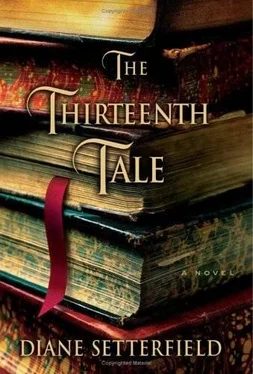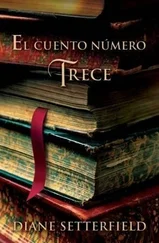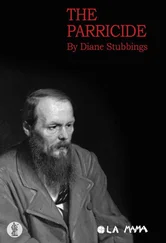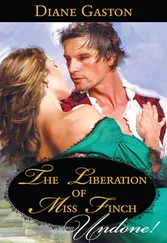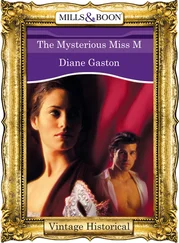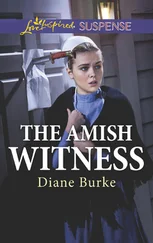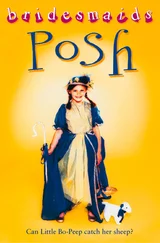"How long?" I asked, when his explanation came to an end.
"I can't tell you. Another person would have succumbed already. Miss Winter is made of strong stuff. And since you have been here-" He broke off with the air of someone who finds himself inadvertently on the brink of breaking a confidence.
"Since / have been here…?"
He looked at me and seemed to wonder, then made up his mind. "Since you have been here, she seems to be managing a little better. She says it is the anesthetic qualities of storytelling."
I was not sure what to make of this. Before I could examine my thoughts, the doctor was continuing. "I understand you are going away… " "Is that why she has asked you to speak to me?" "It is only that she wants you to understand that time is of the essence." "You can let her know that I understand." Our interview over, he held the door as I left, and as I passed him, he addressed me once more, in an unexpected whisper. "The thirteenth tale…? I don't suppose…" In his otherwise impassive face I caught a flash of the feverish impatience of the reader. "She has said nothing about it," I said. "Though even if she had, I would not be at liberty to tell you." His eyes cooled and a tremor ran from his mouth to the corner of his nose. "Good day, Miss Lea." "Good day, Doctor."
On my last day Miss Winter told me about Dr. and Mrs. Maudsley.
Leaving gates open and wandering into other people's houses was one thing, walking off with a baby in its pram was quite another. The fact that the baby, when it was found, was discovered to be none the worse for its temporary disappearance was beside the point. Things had got out of hand; action was called for.
The villagers didn't feel able to approach Charlie directly about it. They understood that things were strange at the house, and they were half afraid to go there. Whether it was Charlie or Isabelle or the ghost that encouraged them to keep their distance is hard to say. Instead, they approached Dr. Maudsley. This was not the doctor whose failure to arrive promptly may or may not have caused the death in childbirth of Isabelle 's mother, but a new man who had served the village for eight or nine years at this time.
Dr. Maudsley was not young, yet though he was in his middle forties he gave the impression of youth. He was not tall, nor really very muscular, but he had an air of vitality, of vigor about him. His legs were long for his body and he used to stride along at a great pace, with no apparent effort. He could walk faster than anyone, had grown used to finding himself talking into thin air and turning to find his walking companion scurrying along a few yards behind his back, panting with the effort of keeping up. This physical energy was matched by a great mental liveliness. You could hear the power of his brain in his voice, which was quiet but quick, with a facility for finding the right words for the right person at the right time. You could see it in his eyes: dark brown and very shiny, like a bird's eyes, observant, intent, with strong, neat eyebrows above.
Maudsley had a knack of spreading his energy around him-that's no bad thing for a doctor. His step on the path, his knock at the door, and his patients would start feeling better already. And not least, they liked him. He was a tonic in himself, that's what people said. It made a difference to him whether his patients lived or died, and when they lived, which was nearly always, it mattered how well they lived.
Dr. Maudsley had a great love of intellectual activity. Illness was a kind of puzzle to him, and he couldn't rest until he'd solved it. Patients got used to him turning up at their houses first thing in the morning when he'd spent the night puzzling over their symptoms, to ask one more question. And once he'd worked out a diagnosis, then there was the treatment to resolve. He consulted the books, of course, was fully cognizant of all the usual treatments, but he had an original mind that kept coming back to something as simple as a sore throat from a different angle, constantly casting about for the tiny fragment of knowledge that would enable him not only to get rid of the sore throat but to understand the phenomenon of the sore throat in an entirely new light. Energetic, intelligent and amiable, he was an exceptionally good doctor and a better than average man. Though, like all men, he had his blind spot.
The delegation of village men included the baby's father, his grandfather and the publican, a weary-looking fellow who didn't like to be left out of anything. Dr. Maudsley welcomed the trio and listened attentively as two of the three men recounted their tale. They began with the gates left open, went on to the vexed issue of the missing saucepans and arrived after some minutes at the climax of their story: the kidnapping of the infant in the perambulator.
"They're running wild," the younger Fred Jameson said finally.
"Out of control," added the older Fred Jameson.
"And what do you say?" asked Dr. Maudsley of the third man. Wilfred Bonner, standing to one side, had, until now, remained silent.
Mr. Bonner took his cap off and drew in a slow, whistling breath. "Well, I'm no medical man, but it seems to me them girls is not right." He accompanied his words with a look full of significance, then, in case he hadn't got his message across, tapped his bald head, once, twice, three times.
All three men looked gravely at their shoes.
"Leave it with me," said the doctor. "I'll speak to the family."
And the men left. They had done their bit. It was up to the doctor, the village elder, now. Though he'd said he would speak to the family, what the doctor actually did was speak to his wife.
"I doubt they meant any harm by it," she said, when he had finished telling the story. "You know what girls are. A baby is so much more fun to play with than a doll. They wouldn't have hurt him. Still, they must be told not to do it again. Poor Mary." And she lifted her eyes from her sewing and turned her face to her husband.
Mrs. Maudsley was an exceedingly attractive woman. She had large brown eyes with long lashes that curled prettily, and her dark hair that had not a trace of gray in it was pulled back in a style of such simplicity that only a true beauty would not be made plain by it. When she moved, her form had a rounded, womanly grace.
The doctor knew his wife was beautiful, but they had been married too long for it to make any difference to him.
"They think in the village that the girls are mentally retarded."
"Surely not!"
"It's what Wilfred Bonner thinks, at least."
She shook her head in wonderment. "He is afraid of them because they are twins. Poor Wilfred. It is just old-fashioned ignorance. Thank goodness the younger generation is more understanding."
The doctor was a man of science. Though he knew it was statistically unlikely that there was any mental abnormality in the twins, he would not rule it out until he had seen them. It did not surprise him, though, that his wife, whose religion forbade her to believe ill of anyone, would take for granted that the rumor was ill-founded gossip.
"I'm sure you are right," he murmured with a vagueness that meant he was sure she was wrong. He had given up trying to get her to believe only what was true; she had been raised to the kind of religion that could admit no difference between what was true and what was good.
"What will you do, then?" she asked him. "Go and see the family. Charles Angelfield is a bit of a hermit, but he'll have to see me if I go."
Mrs. Maudsley nodded, which was her way of disagreeing with her husband, though he didn't know it. "What about the mother? What do you know of her?"
"Very little."
And the doctor continued to think in silence, and Mrs. Maudsley continued her sewing, and after a quarter of an hour had passed, the doctor said, "Perhaps you might go, Theodora? The mother might sooner see another woman than a man. What do you say? "
Читать дальше
